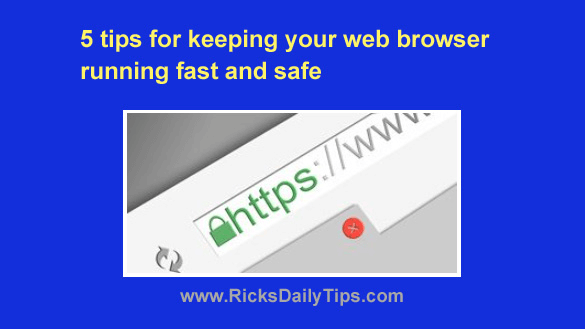
Want to get my easy to follow Tech Tips in your email?
Sign up for my daily Rick’s Tech Tips Newsletter!
These days most home computers are used primarily to visit websites and perform other Internet-related tasks such as checking email and shopping online.
Truth be told, a web browser is the only program that many users ever open in the Internet age.
If you depend on your favorite browser as much as I do, here are a few things you can do to keep it working fast and protect your online accounts from hackers:
1 – Make sure your PC is always free of viruses and other forms of malware.
Today’s hackers and scammers are constantly seeking out new victims, and the easiest way to become one is to allow your computer to become (and remain) infected with a virus. Malware can also make your computer run slow and freeze up on you.
This post is a step-by-step guide to thoroughly scanning your PC for malware and removing any malicious code that is found.
2 – Don’t load your web browser down with dozens of add-ons or extensions.
Every extension that you add to your browser makes it run a little slower. If you only use one extension you probably won’t even notice the slowdown, but using several of them at the same time can really make a big difference in browser performance.
But there’s also another, more serious downside to browser extensions: Every time you add one to Chrome or Firefox you add another potential entry point for hackers to break into your system.
While some extensions are quite useful, adding extensions just for the sake of adding them isn’t a great idea.
3 – As tempting as it might be, don’t allow your browser to store the passwords you use to log in to your online accounts.
I know how convenient it is to have your browser automatically “type” your passwords for you, but it’s a very dangerous practice.
This post explains why stored passwords can easily come back to haunt you.
4 – Always keep every web browser that’s installed on your computer up-to-date with the latest versions and security updates.
Failing to patch security holes in your browsers as soon as updates are released leaves both your Windows installation and your online accounts vulnerable to hack attacks. That’s why it’s important to plug those holes as quickly as possible.
This post explains how to easily ensure that all of your browsers are completely up-to-date.
5 – Delete your browser’s history information and clear its cache on a regular basis.
As you probably know, your web browsers store all kinds of data from your Internet activities.
Unfortunately, all of those cookies, cached images and web pages and other types of stored Internet-related files can really slow your browser down. Even worse, they can cause all kinds of mysterious glitches and hang-ups as you make your way around the Internet.
Every browser offers a way to delete the browser history and clear its cache, but those methods vary from browser to browser. That makes it hard to remember how to do it in every browser.
To make things fast and easy, here’s a method of clearing your browser history that works the same way in every major browser.
Bottom line: Keeping your PC malware-free and your browser up-to-date and clear of clutter will help ensure that your browser runs as quickly and safely as possible.